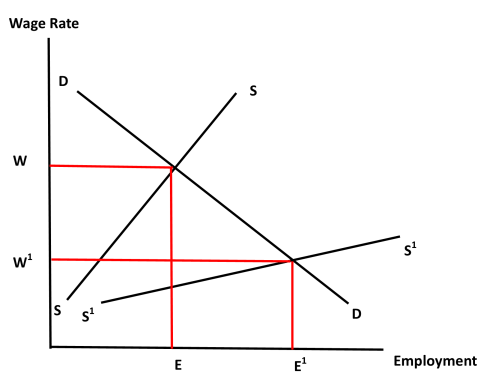In the current Libertarian Enterprise, Sean Gabb looks at the recent outrage at Jeff Bezos and Amazon and recounts how at least one job he’d done in the past is now closed off to casual entrants due to the growth of licensing:
Let us imagine a natural order — that is, a world without states, or at least a world without the extended patterns of state-intervention that now exists. In such a world, wage labour would continue to exist. There are benefits in working for someone else. An employee commits to a contract of permanent service, in return for which he receives reasonable certainty of payment. Not everyone is or wants to be an entrepreneur. Not everyone finds it suitable to keep looking for unsatisfied wants and the most rewarding means of satisfying those wants. This being said, there would probably be much less wage labour than there is now.
If the present order of things does little to deter men like Mr Bezos, it does much to deter little people from starting little businesses — little business that sometimes replace, but more often supplement employed income. When I was much younger, the easiest way I found of making extra money was to drive a mini-cab. I went to the nearest cabbing office. I showed my clean driving licence. I showed a certificate of hire and reward insurance. I handed over £25 rent for the week, and was given a two-way radio and a cabbing number. That evening, I was taking prostitutes to their clients and pushing drunks up their garden paths. You cannot do this nowadays. Cabbing is licensed and regulated. It costs thousands to get a licence, and the regulations about age and type of vehicle add tens of thousands more to the costs of entry. You cannot get into cabbing unless you can pay these entry costs, and unless you are able to pay them back by working there full-time and long-term. A casual business has been made into a profession.
This is an example of which I have personal knowledge. But there is a vast range of little businesses that bring some money to little people. They have nearly all been placed out of reach. The effect is to increase the supply of unskilled labour seeking employment. Think of a supply and demand diagram. Shift the supply curve to the right. Make it more elastic. Money wages will be lower than they would otherwise be. Conditions of work — and these are part of the overall wage — will be worse. Make laws to prevent the market from clearing, and there will be more unemployment.
A further point I mention without choosing to develop is mass-immigration. This is not the kind of movement you would see in a natural order, where virtually the whole cost of entry and adjustment fell on the individual entrant. It is a movement encouraged and subsidised by the State — encouraged by institutional political correctness, and subsidised by laws that amount to forced association. The effect in economic terms is again on the supply curve for labour.
I have no reason to believe that Mr Bezos and Amazon have done anything to bring about this state of affairs. They simply operate in the labour market as they find it. No one is forced to work for Amazon. Amazon is not a legal monopoly, and has no power to force down wages. It pays at least the going rate. It is not a charity, and cannot be expected to behave as a charity. Blaming Amazon for how it pays and treats its workers makes no more sense than blaming a clock for telling the time.
He also touches on the state-created legal situation of limited liability:
I turn to the objection that Amazon is a limited liability company. This is an objection I accept. Limited liability companies exist because of a grant of privilege by the State. They are treated as persons, responsible for their own debts. Their owners have no liability beyond the value of the shares they own. This grant allows companies to gain more investment capital than they otherwise might. It allows them to grow larger and to exist for longer than they otherwise might. It allows even the most entrepreneurial company to turn gradually into a private bureaucracy, trading favours with the various state bureaucracies. Limited liability turns business into the economic arm of a malign ruling class.
So far as Amazon benefits from limited liability, it is an illegitimate enterprise. But this is not the end of the matter. Amazon almost certainly could exist without limited liability. It would instead have raised its investment capital by selling bonds. It would then only be in form what it plainly is in substance — that is, a projection of its owner’s ambition to achieve greatness. It would still have grown large, and it would have grown large by giving its customers what they want.




